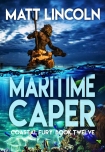The Saboteurs by Clive Cussler (top 10 best books of all time .TXT) 📗

- Author: Clive Cussler
Book online «The Saboteurs by Clive Cussler (top 10 best books of all time .TXT) 📗». Author Clive Cussler
Bell looked back with even deeper appreciation at what he was seeing and the enormity and audacity of the herculean undertaking. Everywhere he gazed he saw the monstrous excavators swinging their booms back and forth, filling train after train, while ahead of them teams of men worked around mobile drilling vehicles bigger than any truck he’d ever seen. They drilled close-knit clusters of holes that would be packed with dynamite. Long, rolling detonations would echo across the artificial canyon as the blasts pulverized rock into manageable chunks for the steam shovels. There was even room for laborers by the thousands, with picks and shovels and hand drills, all trying to feed the insatiable appetite of the excavators.
“At the height of digging,” Westbrook added, “we had more than one hundred steam shovels, four thousand ore cars, a hundred and thirty miles of track, which could be shifted as the work progressed, and more than nine thousand men. With the spoil, we built the Gatun Dam, the longest in the world, plus a three-mile breakwater at the Pacific terminus of the canal, and thereby reclaimed five hundred acres of the Pacific that will be a new town and military fort. And there is still so much overburden that we have a bunch of dumpsites in the jungle.”
“I had no idea,” was all Bell could say.
Westbrook smiled knowingly. “No one really does.”
Bell pointed down the cut to where the wall of the valley bulged. “Why have you left that big pile of rubble on the valley floor?”
Now the young engineer grimaced. “That’s a landslide. One of many we’ve encountered. The biggest is at Cucaracha and is about two million cubic yards’ worth of headache. Eventually, we’re going to have to flood the canal and clear it by dredge.”
“What causes the slides?”
“Rain is a big factor, but really it’s just that the weight of the material we’ve removed kept the earth stable. When we dig it out, the ground needs to find its equilibrium again. The geologists say that this will be a problem for a hundred years or more, and dredging will be a constant part of the canal’s maintenance.
“But to get back to your original question, we’ve been digging here pretty much nonstop since crews first arrived in Panama in 1904.”
“Truly amazing,” Bell said.
“That’s the thing about the canal. Its three principal components—the locks, the Gatun Dam to create a navigable lake, and the Culebra Cut—are each in and of themselves the largest and most daunting engineering challenges ever undertaken. Here we managed to undertake all three simultaneously in hundred-degree heat, ninety percent humidity, and under the constant threat of tropical disease.”
“I had some thoughts about the changes coming to America’s West Coast as a result of the canal’s completion without really thinking through what the canal means for the rest of the country and the world. I believe we are at the dawn of the American Century, where we take our place as a world power.”
“There’s a lot of talk like that down here,” Westbrook agreed. “The great Ferdinand de Lesseps, the architect of the Suez Canal, came here and failed miserably, practically bankrupting his nation and losing twenty thousand men in the process. But we’re about to finish it, Mr. Bell. Little upstart America is going to do what the mighty French could not. We see it as a sort of baton pass, like in a relay race. We’re all mighty proud of what we’ve done, which makes the likes of the Red Vipers doubly vicious. They’re killing our men while also trying to kill our dream.”
“Today was a big escalation on their part.”
“I’m not sure what that means.”
“It doesn’t fit the pattern. They’ve been small-scale, so far, thievery and sabotage, with just some incidental, rather than deliberate, injuries. Then came the attack in California, and now the bombing. Outright murder. What changed here in Panama that led them to such an attack? Their message is out there and spreading. They are garnering allies among the local population, so things are working in their favor for the time being. And time is something they have on their side. Construction will likely carry on for another year, meaning there’s plenty of opportunity to press their case.”
“I hadn’t thought about that.”
Bell shrugged. “And maybe this fits their timetable exactly and I’m talking out of my hat.”
“Let’s head back. I can drop you at the Tivoli.”
“I’m actually staying at the Central.”
“Better choice,” Sam told him. “Tivoli tends to be temporary workers and Washington types, skulking around. There’s usually some interesting characters at the Central.”
14
Fresh from a shower and wearing a cream linen suit with a dark tie and proper shoes rather than his rain boots, Bell slipped into the Central Hotel’s dining room with Marion on his arm. She wore a yellow dress and the smile of a woman who’d just won an argument. Bell had failed to convince her to return to home in light of the bombing.
Bell scanned the space on the off chance he’d recognize someone and immediately spotted Court Talbot at a table with a handful of people. A few of the other tables in the brightly lit room were occupied, but the level of conversation was muted. People were still reeling from the news about the bombing. Ceiling fans stirred the warm smoky air.
Talbot waved Bell to his table. “Ah, the Bells. Join us, please.”
“No. We haven’t eaten yet and all of you have.”
“It doesn’t matter. Sit.” He summoned a waiter. “Bring two bowls of sancocho for my friends.” He pulled out a chair for Marion as he explained. “Sancocho is the national dish. It’s a kind of chicken soup with corn, yams, and fresh cilantro. It’s also good in the morning





Comments (0)